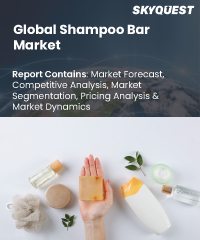
Report ID: SQMIG30L2138

Report ID:
SQMIG30L2138 |
Region:
Global |
Published Date: February, 2024
Pages:
265
|
Tables:
60 |
Figures:
75
Global Shampoo Bar Market size was valued at USD 9.98 million in 2021 and is poised to grow from USD 10.8 million in 2022 to USD 19.41 million by 2030, growing at a CAGR of 7.6% in the forecast period (2023-2030).
The demand for shampoo bars with no plastic waste is being driven by growing awareness of health, hygiene, and the negative side effects of using chemical cosmetics and personal care items over the long term. Customers are also embracing packaging-free personal care items to reduce the rising load of plastic waste. The demand for shampoo made from organic, herbal, and natural ingredients is anticipated to increase in response to rising consumer awareness regarding personal hygiene and safety from potentially hazardous compounds including parabens, phthalates, and aluminum salts. The shampoo bar market is also anticipated to develop due to shifting consumer tastes for products made with organic components because of their advantages, such as dandruff protection and hair fall leadership.
The American Academy of Dermatology (AAD) estimates that hair loss affects 80 million Americans (30 million women and 50 million men). These health concerns are encouraging bar shampoos and other organic and all-natural hair care products.
Plastic waste has recently risen to the top of the list of environmental issues due to the harm it does to marine life, humans, and other terrestrial animals. An estimated 242 million tons of plastic waste was generated globally in 2016, according to the World Bank Group. Additionally, the non-profit group "Our World in Data" claims that commodity packaging is the most prevalent application area and is responsible for around 42% of all plastic waste created globally. This global issue has caused manufacturers to discontinue utilizing plastic packaging, especially for cosmetics items. These worldwide environmental issues will promote packaging-free shampoo bars in the near future.
Government regulations favor the use of natural and organic cosmetics and personal care items. For instance, the European Commission changed Annex II of the EU Cosmetic Regulation to forbid the use of five different forms of parabens, including isopropylparaben, isobutylparaben, phenyl paraben, benzylparaben, and pentylparaben, in cosmetic products. The utility of shampoo bars is anticipated to be supported in the near future by these strict government regulations.
Our industry expert will work with you to provide you with customized data in a short amount of time.
REQUEST FREE CUSTOMIZATIONWant to customize this report? This report can be personalized according to your needs. Our analysts and industry experts will work directly with you to understand your requirements and provide you with customized data in a short amount of time. We offer $1000 worth of FREE customization at the time of purchase.

Report ID: SQMIG30L2138